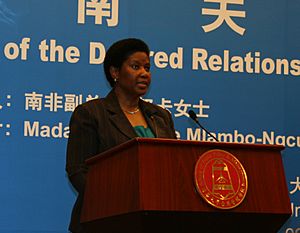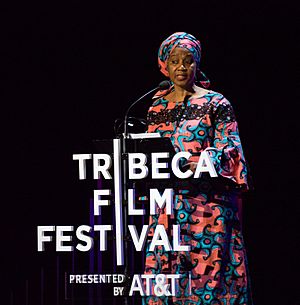Phumzile Mlambo-Ngcuka facts for kids
{{Infobox officeholder | name = Phumzile Mlambo-Ngcuka | image = Phumzile Mlambo-Ngcuka 2014.jpg | caption = Mlambo-Ngcuka in 2014 | office = Under-Secretary-General of the United Nations
Executive Director of UN Women | 1blankname = Secretary General
| 1namedata =
| term_start = 13 August 2013 | term_end = 19 August 2021 | predecessor = Michelle Bachelet | successor = Sima Sami Bahous | office2 = 4th Deputy President of South Africa | president2 = Thabo Mbeki | term_start2 = 22 June 2005 | term_end2 = 23 September 2008 | predecessor2 = Jacob Zuma | successor2 = Baleka Mbete | office3 = Minister of Minerals and Energy | president3 = Nelson Mandela
Thabo Mbeki | term_start3 = 17 June 1999 | term_end3 = 21 June 2005 | predecessor3 = Penuell Maduna | successor3 = Lindiwe Hendricks | office4 = Acting Minister of Arts, Culture, Science and Technology | term_start4 = 3 February 2004 | term_end4 = 30 April 2004 | president4 = Thabo Mbeki | successor4 = Ben Ngubane | office5 = Member of the National Assembly of South Africa | term_start5 = 27 April 1994 | term_end5 = September 2008 | predecessor5 = Constituency established | successor5 = Andries Nel | constituency5 = KwaZulu-Natal | office6 = Deputy Provincial Chairperson of the African National Congress in Western Cape | term_start6 = April 1994 | term_end6 = 1996 | 1blankname6 = Chairperson | 1namedata6 = Chris Nissen | predecessor6 = Position established | successor6 = Nomaindia Mfeketo
Phumzile Mlambo-Ngcuka (born 3 November 1955) is a South African politician and a former leader at the United Nations. She was the Executive Director of UN Women, an organization that works for the rights of women and girls around the world.
Mlambo-Ngcuka was also the Deputy President of South Africa from 2005 to 2008. She was the first woman to ever hold this job. This made her the highest-ranking female leader in South Africa's history at that time. As deputy president, she worked on projects to fight poverty and help people in need.
Contents
|
|||||||||||||||||||||
| Personal details | |||||||||||||||||||||
|---|---|---|---|---|---|---|---|---|---|---|---|---|---|---|---|---|---|---|---|---|---|
| Born |
Phumzile Mhlambo
3 November 1955 Clermont, KwaZulu-Natal, Union of South Africa |
||||||||||||||||||||
| Political party | African National Congress (1994–2009, 2009–present) | ||||||||||||||||||||
| Other political affiliations |
Congress of the People (until 2009) | ||||||||||||||||||||
| Spouse | Bulelani Ngcuka | ||||||||||||||||||||
| Children | 5 | ||||||||||||||||||||
| Alma mater |
|
||||||||||||||||||||
| Occupation |
|
||||||||||||||||||||
Early Life and Schooling
Phumzile Mlambo-Ngcuka was born in Clermont, KwaZulu-Natal, South Africa. She went to college and earned a bachelor's degree in social science and education from the National University of Lesotho in 1980.
Later, she earned a master's degree from the University of Cape Town in 2003. Her studies focused on planning and policy for education. In 2013, she received a doctorate from the University of Warwick for her research on using mobile technology to help train teachers.
Working to Help Young People
From 1981 to 1983, Mlambo-Ngcuka was a teacher in KwaZulu-Natal. She then moved to Geneva, Switzerland, to work for the World Young Women's Christian Association (YWCA) from 1984 to 1989. As the Youth Director, she helped create jobs for young people and supported education in Africa, Asia, and the Middle East.
She also started an organization called the Young Women's International Programme. Back in South Africa, she directed a group in Cape Town that helped women in poor communities become more independent by teaching them new skills. Throughout her career, she has focused on human rights, fairness for women, and helping young people.
Career in South African Politics
Member of Parliament
In 1994, Mlambo-Ngcuka became a Member of Parliament in South Africa. From 1996 to 1999, she was the deputy minister for the Department of Trade and Industry.
From 1999 to 2005, she served as the Minister of Minerals and Energy. In this role, she helped change the rules for mining. Before, large companies controlled most of the country's minerals. Her new "use it or lose it" policy meant that mining rights could be given to more people, including many Black South Africans who had been left out before.
The "Oilgate" Controversy
While Mlambo-Ngcuka was Minister of Minerals and Energy, a government-owned oil company called PetroSA paid money to a private company. This private company then gave money to the African National Congress (ANC) political party before an election. The media called this the "Oilgate" controversy.
There was no evidence that Mlambo-Ngcuka was involved in this. To prove she had done nothing wrong, she asked for an official investigation. The final report showed that she was not involved at all.
Deputy President of South Africa

On 22 June 2005, President Thabo Mbeki chose Mlambo-Ngcuka to be the Deputy President of South Africa. She took over the position from Jacob Zuma. Her husband, Bulelani Ngcuka, was the head of the department in charge of fighting crime in South Africa.
Soon after she was appointed, some people who supported Zuma showed their disapproval at a public event. In 2008, President Mbeki resigned from his job. Following his resignation, Mlambo-Ngcuka and most of the other government ministers also resigned on 23 September 2008.
Leader at the United Nations
On 10 July 2013, Mlambo-Ngcuka was appointed as the Executive Director of UN Women. This part of the United Nations is dedicated to gender equality and empowering women. She took over from Michelle Bachelet.
Under her leadership, UN Women launched the famous HeForShe campaign. This campaign encourages men and boys to support women's rights. She also helped start the Elsie Initiative, which aims to get more women involved in peacekeeping missions around the world.
During her time at UN Women, Mlambo-Ngcuka helped raise over 40 billion US dollars. This money came from governments, companies, and regular people. The funds support projects that create big changes for women and girls everywhere. She left UN Women in August 2021 after serving for eight years.
Other Important Work
Mlambo-Ngcuka has been involved in many other important activities. She has served on boards and councils for organizations that fight diseases, protect children from violence, and support education.
In 2022, she played a key role as a mediator in peace talks between the government of Ethiopia and leaders from the Tigray region. A mediator is someone who helps two sides in a conflict find a peaceful solution. Thanks to these talks, a peace treaty was signed on 2 November 2022, officially ending the Tigray War.
Personal Life
Mlambo-Ngcuka is married to Bulelani Ngcuka, a former top prosecutor in South Africa. They have five children, four of whom are adopted.
See also
 In Spanish: Phumzile Mlambo-Ngcuka para niños
In Spanish: Phumzile Mlambo-Ngcuka para niños


